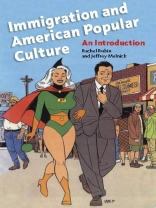A unique study that hones in on the cross-section and interdependency of immigration and American cultural production
How does a ‘national’ popular culture form and grow over time in a nation comprised of immigrants? How have immigrants used popular culture in America, and how has it used them?
Immigration and American Popular Culture looks at the relationship between American immigrants and the popular culture industry in the twentieth century. Through a series of case studies, Rachel Rubin and Jeffrey Melnick uncover how specific trends in popular culture—such as portrayals of European immigrants as gangsters in 1930s cinema, the zoot suits of the 1940s, the influence of Jamaican Americans on rap in the 1970s, and cyberpunk and Asian American zines in the1990s—have their roots in the complex socio-political nature of immigration in America.
Supplemented by a timeline of key events and extensive suggestions for further reading, Immigration and American Popular Culture offers at once a unique history of twentieth century U.S. immigration and an essential introduction to the major approaches to the study of popular culture. Melnick and Rubin go further to demonstrate how completely and complexly the processes of immigration and cultural production have been intertwined, and how we cannot understand one without the other.
Over de auteur
Jeffrey Melnick is Associate Professor of American Studies at Babson College. He is author of A Right to Sing the Blues: African Americans, Jews, and American Popular Song and Black-Jewish Relations on Trial: Leo Frank and Jim Conley in the New South.












